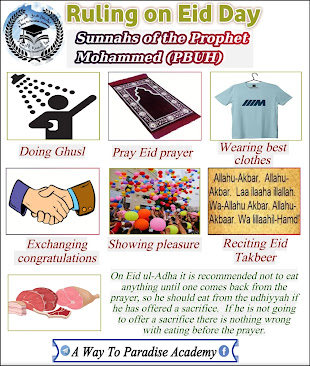Sunan of Eid Day
Sunan of Eid Day
What Should Be Done On ‛Eid Day?
🎁🎉On this day, a Muslim who is not performing hajj engages in the same activities he normally does on the Festival of Fast Breaking (‛Eid-ul-Fitr), with the exception of paying Zakaat-ul-Fitr, which applies only to ‛Eid-ul-Fitr.
A distinctive feature of ‛Eid-ul-Adhaa is the slaughtering of a sacrificial animal, which is considered to be a highly recommended act of worship.
Ud-hiyah, or sacrificial animal, refers to any of the pastoral animals (sheep, cows or camels) that are slaughtered during the Festival of Sacrifice (‛Eid-ul-Adhaa) with the intention of seeking closeness to Allah. The time for offering a sacrifice begins after the ‛Eid-ul-Adhaa prayer and lasts until the sunset of the 13th day of Dhul-Hijjah.
The following are recommended acts that bring additional reward on Eid ul-Adha. No need to worry if you forget some, but try to do as many as possible to maximize your reward👇
a) Ghusl or bathing early in the day before the Eid prayer.🛁🚿
b) Beautifying oneself: 🥼👕
The Prophet used to wear his best clothes to go to the Eid prayer. He had a cloak that he wore specifically on the two Eids and Friday.
c) Saying takbeer (proclamation of the greatness of Allah) is a distinctive feature of Eid and is mentioned in the Quran:
"*…And that you should exclaim Allah's greatness for having guided you, so that you may be grateful." *(Quran 2:185)
d) The Prophet would take different routes for going and coming back from the Eid prayer.
e) On Eid ul-Adha it is recommended not to eat anything until one comes back from the prayer, so he should eat from the udhiyyah if he has offered a sacrifice. If he is not going to offer a sacrifice there is nothing wrong with eating before the prayer.



تعليقات
إرسال تعليق